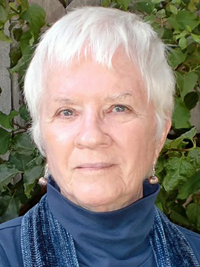
Your complimentary articles
You’ve read one of your four complimentary articles for this month.
You can read four articles free per month. To have complete access to the thousands of philosophy articles on this site, please
News
News: April/May 2025
Creator of feminist standpoint theory dies • New study: do babies have moral intuitions? • Time travel with chimpanzees — News reports by Anja Steinbauer
Sandra G. Harding has died

Sandra G. Harding
Photo © Emily Harding-Morick
Prominent feminist and social philosopher Sandra Harding died on 5th March 2025 at the age of 89. Harding was a professor at the University of Delaware from 1975 to 1996, then at UCLA until 2014 , where she held the post of director of the UCLA Center for the Study of Women from 1996-1999. She was a consultant to several United Nations organisations such as UNESCO, the Commission on Science and Technology for Development, the Pan American Health Organisation and the U.N. Development Fund for Women, and she co-edited a chapter of UNESCO’s World Science Report 1996 on ‘The Gender Dimension of Science and Technology’.
Harding made several very original contributions to feminist philosophy. An example is the idea of ‘strong objectivity’. Harding argues that research in the social sciences conducted in a ‘value neutral’ way by male researchers unavoidably incorporates an unintended androcentric bias. She called this way of working ‘weak objectivity’. She suggests that starting research explicitly from women’s viewpoints, taking a point of departure from the real lives of women, strengthens the bias but makes it easier to spot, therefore offering benefits for research. So, ‘strong objectivity’ amplifies researcher bias in order to make clear that the research is seen from this particular perspective. This ties into her work on ‘standpoint theory’, which brought her international acclaim. It is the critical study of science as a context-bound and culturally embedded project, rather than the traditional view of science as neutral and objective. A prolific writer, Harding authored several books, including the prize-winning The Science Question in Feminism and she also published more than 100 scholarly articles and book chapters.
Ervin Nagy has died
Ervin Nagy was a Hungarian journalist, politician and political philosopher. He trained in philosophy at Eötvös Lorand University, specialising in political thought. Then in 2003 he co-founded the rightwing political party Jobbik.He later left the party, together with others, in 2008 due to alarm about the direction it was taking. He lectured in philosophy at Károli Gáspár Reformed University and was an academic at the 21st Century Institute. He also developed a career in publishing and as a public intellectual, appearing regularly on TV discussion programmes in Hungary. He was the author of several publications, including The Illusions of Liberalism (2014) and a book of philosophical essays called Crumbling Delusions (2016). The philanthropist and father of three children has passed away aged 47.
Philosophy Unit in Peril Again
As a university funding crisis in the UK deepens, the Centre for Research in Modern European Philosophy (CRMEP), not for the first time, is facing closure. This first happened in 2010, when its original home, Middlesex University, ceased funding the Centre after 15 years of existence. Luckily, it was offered a lifeline in the nick of time by Kingston University and most of its researchers were able to move there to continue their work. However, now Kingston too has announced that CRMEP must close. Jürgen Habermas, Judith Butler and Slavoj Zizek were among many well known philosophers who signed a letter of protest when funding cuts were first announced last year. Their letter called CRMEP “one of the most valuable and distinctive centres of philosophical research anywhere in the English-speaking world.” Staff and unions at Kingston University have taken exception to the “barrage of closures to courses and entire departments”, arguing, among other things, that the process had been “unlawful and unreasonable.”
Is Morality Innate?
Is morality innate, or do we learn it from our elders, or develop it from social interactions? To establish whether we are born with moral intuitions, about forty teams of developmental psychologists from all over the world have cooperated on a study about moral awareness in very young children. Previous research on this matter had yielded contradictory results, though some studies had suggested that even very young humans have some understanding of the moral content of certain social situations and prefer helpful figures to unhelpful ones. In the new study, more than 1,000 infants, aged 5.5–10.5 months, participated at 37 labs across five continents. They were shown scenes involving characters that either helped another person climb a mountain or blocked their progress and pushed them back down. The study, published in the January 2025 issue of the journal Developmental Science, showed that about half of the children preferred the helpful character. The report concluded that no evidence was found of moral preference in infants: “Overall, 49.34% of infants preferred Helpers over Hinderers in the social condition, and 55.85% preferred characters who pushed up, versus down, an inanimate object in the nonsocial condition; neither proportion differed from chance or from each other.”
Habermas Calls for Rearmament
In an article in the Süddeutsche Zeitung, renowned philosopher Jürgen Habermas has advocated that EU countries shouldn’t merely make temporary efforts at military cooperation for the purposes of supporting Ukraine. Rather, they should now hone their combined military potential to give them a greater ability to act, because otherwise “they will count for nothing in a world which is geopolitically on the move and fragmenting.” However, he also warned against any increased militarism in his home country of Germany, hoping it to have become impossible after a “world historical learning process” led to the abolition of conscription there in 2011.
Time Travel with Chimpanzees
Philosophy Now doesn’t normally announce philosophy research positions that have opened up, but this one is too good to pass over in silence. The University of Sydney is advertising a PhD scholarship in Philosophy enquiring into “mental time travel in humans and non-human animals.” If you are adventurous enough to apply, be prepared to spend some time at a remote research station in the Congo (not the DRC) working with chimpanzees. But at other times you’ll also be working with human children, and drawing statistically-backed comparisons between the two species. What do you have to bring to the party? A focus on philosophy of mind or time and comparative psychology and/or evolutionary biology, knowledge of multivariate statistical analysis, and “experience conducting cognitive experiments with great apes, other primates or other animals is highly desirable.” Further details have been posted on the university’s website.

Preparing to time travel
© The Nature Box 2018 Creative Commons 4.0









